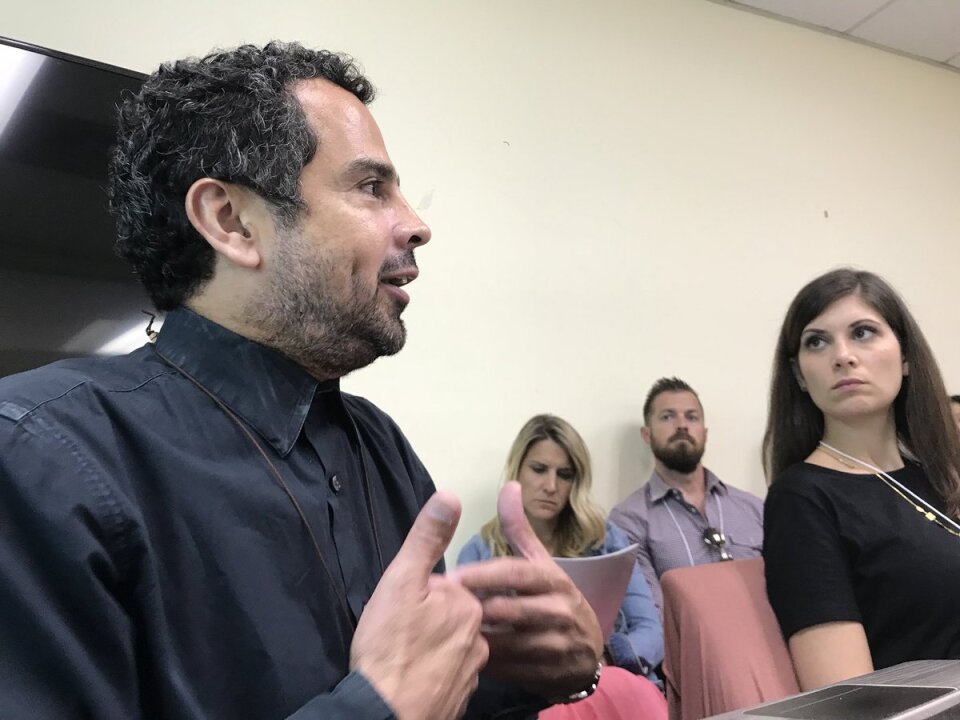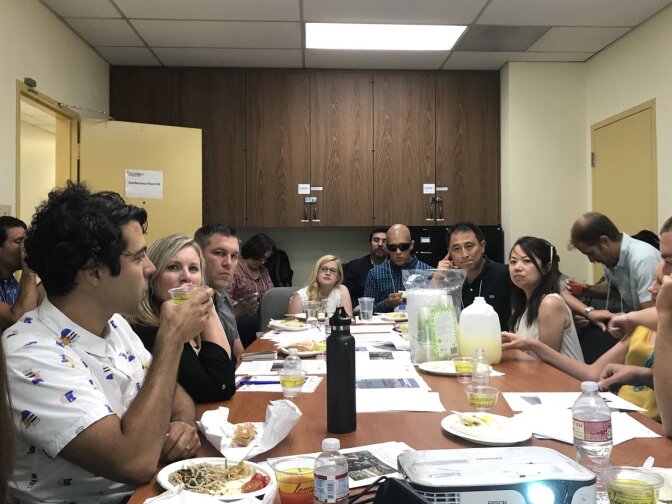Truth matters. Community matters. Your support makes both possible. LAist is one of the few places where news remains independent and free from political and corporate influence. Stand up for truth and for LAist. Make your year-end tax-deductible gift now.
This archival content was originally written for and published on KPCC.org. Keep in mind that links and images may no longer work — and references may be outdated.
Faith leaders learning to make immigration less removed from lives of their congregations
The immigration crackdown by the Trump administration in Los Angeles has spawned no shortage of activists, local clergy included. In their prayer shawls and collars, some faith leaders are among the most visible in demonstrations supporting immigrants, with a couple dozen getting arrested recently in downtown L.A. in a show of civil disobedience.
One by one, LA clergy leaders protesting treatment of migrant children arrested outside federal courthouse as human wall is broken up pic.twitter.com/MDOBeGHhLw
— Josie Huang (@josie_huang) June 26, 2018
But for other Southern California clergy, the immigration debate can feel removed from their daily lives — like for some among the 30-plus pastors taking part in an immigration workshop earlier this week.
Guillermo Torres, a trainer with the interfaith group Clergy & Laity United for Economic Justice (CLUE), scanned a packed conference room in its downtown L.A. offices that included Presbyterians, Baptists and Lutherans — some from the city, some from suburbs with homogenous congregations that don’t have many immigrants in the pews.
But Torres was determined to show all of them why they and their churches need to fight for immigrant rights.

“Faith leaders have the moral imperative to be the conscience of this country when we are witnessing such uncompassionate policies towards people of the immigrant community,” Torres said.
He suggested how faith communities can get involved, including offering sanctuary for asylum-seekers and those facing deportation and creating legal funds for immigrants who need the help.
“We need to be connected to the suffering of others,” Torres said. “They need to see us out there. For a person that’s oppressed, a religious figure standing with them in solidarity — that means a lot.”
The group attending the workshop was made up of early-career clergy who are part of the Communitas pastoral leadership program at Pepperdine University as well as some of their spouses. While they were receptive to Torres’ message, some wondered if their congregations are ready to tackle immigration issues.
Isis Pickens, a youth minister at the predominantly African-American Zion Hill Baptist Church in South Los Angeles, said other issues can take priority.
“Sometimes it can feel like the immigration conversation is outside our community because we are so inundated with other economic issues,” Pickens said. “But it is something we need to engage.”
Pickens says the young people in her church, those 18 and under, are particularly interested in issues affecting people outside the immediate community. She planned to invite some to the next training that CLUE is leading on how to help immigrant detainees on July 19 at Temple Israel in Long Beach.
Why should faith leaders step up? @ClueJustice spokeswoman Tessie Borden: “We can fill the moral space between what the (Trump) administration says is legal and what is actual justice.” pic.twitter.com/CI4BGtyv4U
— Josie Huang (@josie_huang) July 10, 2018
Torres acknowledged that religious people are divided over Trump immigration policies. Top evangelical leaders like Franklin Graham have lamented the family separations brought on by federal immigration policy but have side-stepped criticism of the president.
In the workshop of LA-area clergy, there were dismayed sighs and shaking heads whenever Torres brought up the issue of migrant children separated from their families.
Immigration is not an issue that Jenny Chrien has to personally contend with as pastor of a mostly white congregation at the Shepherd of the Valley Lutheran Church in Simi Valley. Nor is it an issue that Simi Valley officials are happy about, with the council coming out against California’s sanctuary state law that limits cooperation by local police with federal immigration agents.
So Chrien was trying to nail down ways to help her congregation identify with the uncertainty and fear facing many immigrants under the Trump administration’s strict enforcement policies. Perhaps, she said, she would bring in a participant in the Deferred Action for Childhood Arrivals program to share his or her story.
DACA participants, brought to the U.S. without authorization as children, have been allowed to temporarily live and work legally in the U.S., but that permission will expire unless Congress acts.
“I think it can build compassion for something that might seem like it’s the ‘other,’” Chrien said.
Torres advised the room that it's timely to introduce immigration issues to congregations, given that so many in the country have been following the family separations, and the slow process to reunite children with parents.
“People are more open to hearing these stories than ever before,” Torres said. “Their hearts are open.”
Josie Huang covers religion, international affairs and the Southern California diaspora under a grant from the Luce Foundation.










